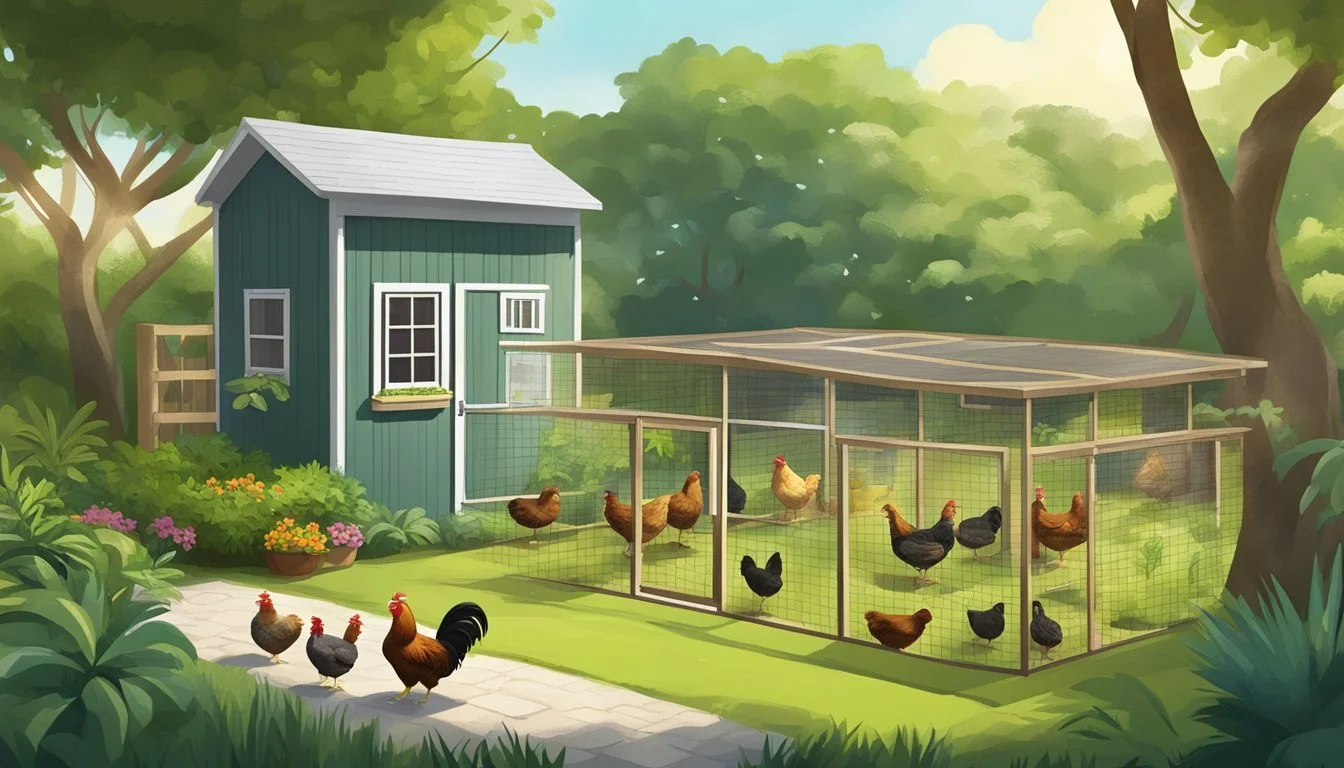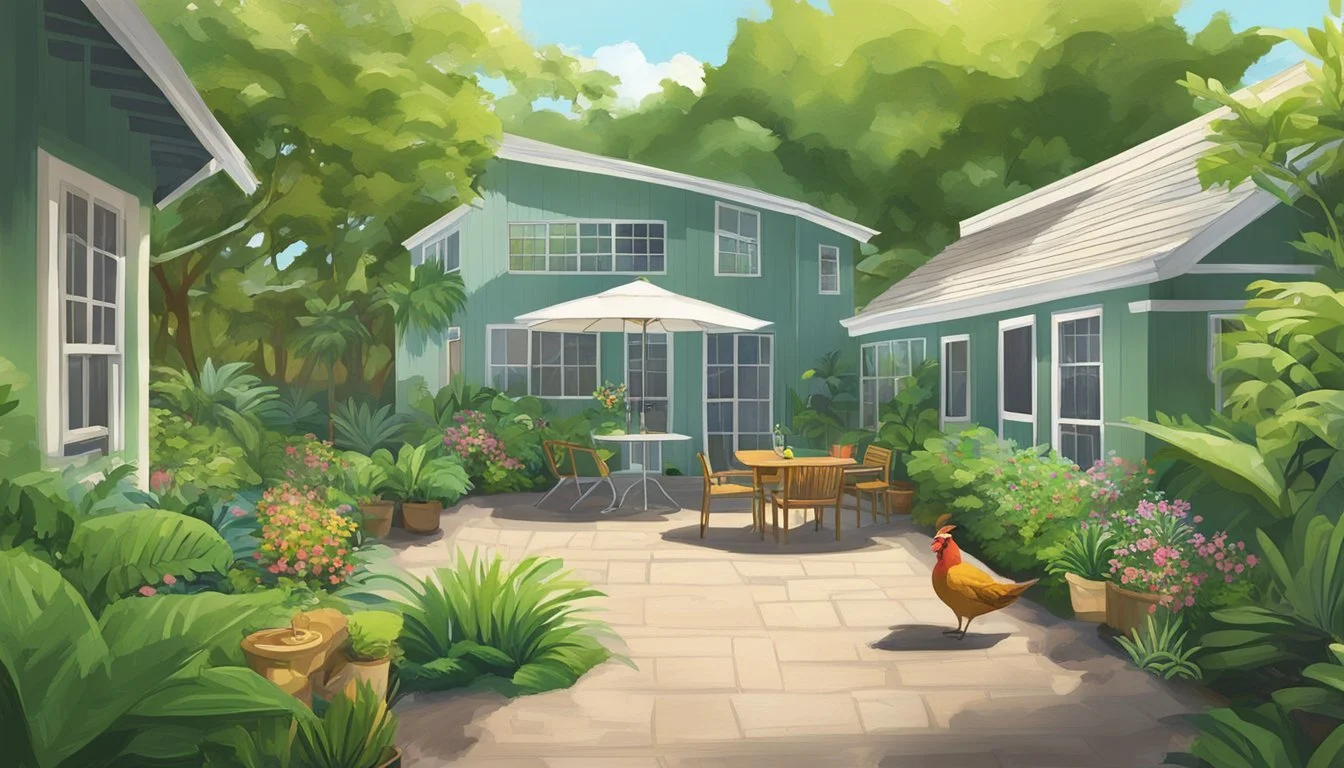Keeping Backyard Chickens in Fort Lauderdale, FL
Essential Tips for Urban Poultry Farming
Raising backyard chickens has become increasingly popular in urban areas, offering residents a chance at self-sustainability and a connection to their food sources. In Fort Lauderdale, Florida, the city acknowledges this growing trend by setting clear regulations for those interested in cultivating their own flock within city limits. Adhering to these rules is important not only for compliance but also for maintaining good relations with neighbors and ensuring the welfare of the chickens themselves.
Fort Lauderdale permits residents to keep chickens on their property, subject to specific conditions that aim to balance urban living with agricultural practices. For instance, there is a limit on the number of chickens one can keep, and roosters are subject to additional restrictions to minimize noise disturbance. Coop specifications and placement are also regulated to ensure the safety and cleanliness of both the flock and the surrounding community.
Understanding and following Fort Lauderdale's chicken ordinances is essential for anyone considering raising backyard chickens. While the state of Florida is generally receptive to the idea of backyard flocks, each city and county within the state may have its own set of rules, making it imperative for residents to familiarize themselves with local laws. Compliance ensures that individuals can responsibly enjoy the benefits of raising chickens, such as fresh eggs and the joys of animal husbandry, without negatively impacting their city environment.
Understanding Local Chicken Ordinances
Keeping chickens in Fort Lauderdale is subject to city-specific regulations as well as broader state law. It is important for potential and current owners to respect the limits and restrictions imposed by various levels of government to responsibly enjoy the benefits of urban poultry farming.
Fort Lauderdale Specific Regulations
In Fort Lauderdale, residents are allowed to keep up to four chickens on their property. However, there are clear stipulations when it comes to roosters; they are permitted only if they are housed at least 100 feet away from any inhabited residence. Specific zoning regulations oversee the placement and construction of chicken coops within residential areas. For details on coop requirements and permit applications, individuals should consult the City of Fort Lauderdale’s Planning & Zoning Board or visit library.municode.com for the full ordinance text.
Florida State Poultry Laws
Statewide, Florida is considered chicken-friendly, with various ordinances allowing backyard chickens in many municipalities. Nonetheless, state laws don't override city or county laws; residents must comply with the stricter of the regulations. Different cities such as Miami, Tampa, Cape Coral, Orlando, Tallahassee, Hollywood, and West Palm Beach may have their own sets of rules governing the keeping of chickens. It's advisable for chicken enthusiasts to review statewide information and resources on chicken laws, which can be found on platforms like ChickenLaws.com.
County and City Ordinance Variations
Broward County, the county in which Fort Lauderdale is located, may have additional regulations that influence city ordinances. People interested in raising chickens should refer to the municipal ordinances for accurate information. Permit requirements, if any, will vary between municipalities, and it’s essential that residents check with local authorities before starting their flocks. The county’s official website or the local library's municipal code site, library.municode.com, often provides a comprehensive link for more information about local chicken laws.
Preparation for Raising Chickens
Before introducing chickens to your Fort Lauderdale backyard, it's crucial to establish a suitable environment for them that balances compliance with local regulations with the essentials for a healthy flock.
Choosing the Right Location
When selecting a spot for your chicken coop, you must adhere to local ordinances which dictate that any coop must be at least 100 feet away from inhabited residences, to mitigate noise concerns, particularly if keeping roosters. In addition, the location should offer:
Shade to protect chickens from the Florida heat.
Drainage to ensure the area remains dry and sanitary.
Security against predators such as raccoons and birds of prey, which might attempt to access the coop.
Constructing a Chicken Coop
The construction of a chicken coop in Fort Lauderdale should follow specific guidelines to keep the flock safe and productive. The structure must:
Ventilation: Provide ample ventilation while keeping the space well-ventilated to facilitate airflow and reduce humidity.
Size: Comply with the Fort Lauderdale regulations, potentially requiring permits if the coop exceeds certain dimensions.
Materials: Use durable materials capable of withstanding weather conditions and deterring predators.
Additionally, the coop’s interior layout should include nesting boxes for hens to lay eggs and roosting bars for chickens to rest.
Feeding and Watering Essentials
For a flock to thrive, consistent access to food and water is vital. A few key considerations include:
Water Dispensers: Implement reliable water dispensers that can keep water clean and fresh, even in warmer temperatures.
Feeding Stations: Establish feeders that are easy to access for the chickens but designed to minimize waste.
Nutrition: Provide a balanced diet appropriate for the age and productive state of your hens.
By carefully considering the location, housing structure, and nourishment needs, you can create a thriving environment for backyard chickens in Fort Lauderdale.
Daily Care and Maintenance
Regular attention to health and cleanliness is essential in maintaining a backyard flock, ensuring the chickens' well-being and productivity in terms of egg quality. Proper protection against predators and pests is equally crucial to prevent stress and disease in poultry.
Health and Cleanliness
A clean environment is pivotal for preventing the spread of bacteria and disease within a chicken coop. Residents should perform daily checks to ensure their chickens have access to fresh water and food. Waterers must be scrubbed with soap and water at least once a week, while feeders should be checked daily for contamination and filled with appropriate feed.
Each coop should have proper ventilation, which helps reduce dampness and the concentration of ammonia from waste—factors that can seriously harm a flock's respiratory health. A weekly cleaning routine includes removing soiled bedding and replacing it with fresh material. Monthly deep cleans are advised, with the coop being scrubbed to remove buildup and waste.
Composting chicken manure is an effective method to deal with waste while creating beneficial soil amendments. However, the compost needs to be managed properly to avoid attracting pests or harboring disease.
Protecting Against Predators and Pests
A key component in chicken maintenance is safeguarding the flock from potential predators and harmful pests. Coops and runs should be fortified with solid construction and mesh wiring small enough to prevent snakes, rodents, and larger predators like raccoons from gaining access. Regular inspections for holes, gaps, or damage are essential to ensure the integrity of the coop.
At dusk, chickens should be secured inside their coop, as this is when many predators are most active. Adequate lighting can serve as a deterrent. Additionally, the area around the coop should be kept clean of food waste and debris to avoid attracting unwanted visitors.
Natural methods, such as planting herbs that repel insects or introducing nematodes to control fly larvae, are effective against pests. A balanced approach to flock management, emphasizing clean practices and secure housing, helps maintain healthy chickens and high-quality egg production.
Legal and Ethical Considerations
In Fort Lauderdale, FL, residents considering the prospect of keeping backyard chickens must navigate specific legal stipulations and ethical practices to ensure a harmonious coexistence within the community.
Noise and Nuisance Management
The city allows a maximum of four chickens per property, but the presence of these birds raises concerns regarding noise, which can be a nuisance to neighbors. To address this, roosters are permitted on the condition that they are housed at least 100 feet from any inhabited dwelling, reducing the likelihood of noise-related complaints. Furthermore, owners should implement measures to mitigate odors and dust, which includes regular cleaning of the coop and proper waste management to minimize nuisances.
Understanding Slaughter Regulations
Slaughtering of chickens in residential areas can be a delicate matter with legal and ethical implications. Owners need to be aware that although the keeping of chickens is permitted, there may be limits and regulations governing the slaughtering process. These rules are put in place to ensure that both animal welfare concerns and community standards are respected. One should acquire the necessary permits and a thorough understanding of local ordinance to ensure compliance with any slaughtering regulations that may exist.
Residents should always consult with local authorities to stay updated on the latest regulations and guidelines to maintain responsible and legal backyard chicken keeping practices.
Community Engagement and Resources
For residents interested in keeping backyard chickens in Fort Lauderdale, FL, community engagement and accessing a wealth of resources play a vital role in ensuring adherence to local chicken laws and successful poultry management.
Joining Local Poultry Clubs
Local poultry clubs offer invaluable support for individuals and families embarking on the venture of backyard chicken keeping. These clubs typically provide a platform for sharing experiences, exchanging knowledge on care and breeding, and navigating chicken ordinances specific to Fort Lauderdale neighborhoods. They can also be an excellent resource for learning about zoning requirements, as these can vary and might include limitations on the number of animals or specify conditions related to noise control.
Noise Concerns: Club members often provide advice on managing hens to minimize disturbances, aligning with local noise ordinances.
Local Chicken Laws: Detailed information can be acquired from these groups regarding municode library links that specify legalities related to poultry in various cities including Sarasota, West Palm Beach, and Jacksonville.
Finding Further Information and Support
For those looking for exhaustive information on chicken keeping in their community, a recommended starting point is the library.municode.com. This website provides a comprehensive hub for municipal codes, including those relevant to keeping chickens.
Research and Assistance: Residents can utilize this tool for in-depth research into city ordinances and seek assistance from local government officials if clarity on regulations is needed.
Local Chicken Laws: The municipal code will outline specifics, such as the permissible number of hens, coop specifications, and rules on zoning. It is essential for Fort Lauderdale residents to be aware of these details.
Fort Lauderdale's commitment to urban agriculture is exemplified by its allowance for backyard hens, subject to adherence to local regulations. Residents’ ability to thrive in their backyard poultry endeavors is enriched through active participation in local poultry clubs and making use of available educational resources.







